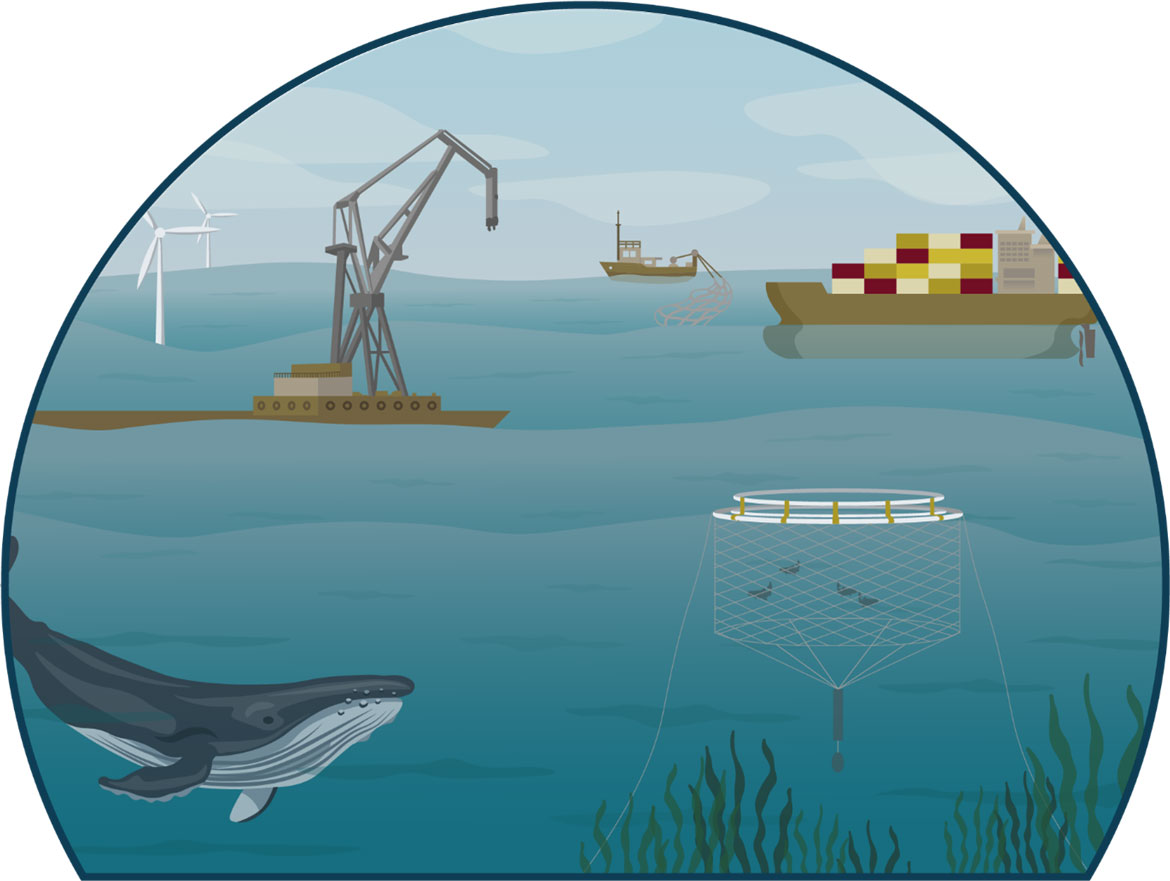Integrated oceans management
On this page
- Oceans governance approach
- Overview
- Canada’s commitment to integrated oceans management
- Operationalizing integrated oceans management
Oceans governance approach
Canada’s Oceans Strategy (2002) (PDF, 840 KB) provides a foundational definition of integrated management or integrated oceans management:
A continuous process through which decisions are made for the sustainable use, development, and protection of areas and resources. Integrated management acknowledges the interrelationships that exist among different uses and the environments they potentially affect. It is designed to overcome the fragmentation inherent in a sectoral management approach, analyzes the implications of development, conflicting uses and promotes linkages and harmonization among various activities.
Integrated oceans management in the context of oceans governance is:

- a comprehensive way of planning and managing human activities so that they do not conflict with one another and so all factors are considered for the conservation and sustainable use of marine resources and shared use of ocean spaces
- a collaborative approach that cannot be forced on anyone
- a flexible and transparent planning process that respects existing divisions of constitutional and departmental authority, and does not abrogate or derogate from any existing Aboriginal or treaty rights
Other leading global definitions include Marine Spatial Planning Global, Ocean Panel, (World Resources Institute).
Overview
Current issues and solutions relating to coastal and marine systems are complex and cross-cut sectors and scales. The ocean is a busy, fragmented space where various users compete for access and resources, and it’s crucial to manage these competing interests equitably and effectively. This situation is further complicated by multiple jurisdictions, compounding pressures such as climate change, pollution and widespread loss of biodiversity.
Moving away from a siloed or sector-based ocean management approach is integrated oceans management. It is also sometimes referred to internationally as integrated management, Integrated Coastal and Marine Management (ICM) or Integrated Coastal and Oceans Management (ICOM) internationally. The integrated oceans management approach offers a holistic and strategic form of governance that is necessary in the pursuit of sustainable development and seeks to address multiple objectives across ocean uses, rather than a single objective or ocean use.
The well-being of Canadians can be improved with the management of ocean uses and activities that support multiple objectives, such as:
- environmental
- economic
- social
- cultural
Integrated oceans management can help:
- preserve the long-term health and resilience of marine ecosystems
- support ecosystem services
- address conflicting uses in our ocean spaces
- create jobs as part of a thriving sustainable ocean economy
No one group can achieve integrated oceans management alone. It is done in partnership with rightsholders and stakeholders across our vast ocean areas.
Canada’s commitment to integrated oceans management
Broadly, the Government of Canada (GC) is committed to:
- protecting and conserving marine environments
- supporting the economic potential of our oceans
- promoting social and cultural wellbeing
- advancing reconciliation objectives
Canada’s commitment to integrated oceans management is solidified under section 31 of Canada’s Oceans Act, which provides the Minister of Fisheries and Oceans the authority to:
lead and facilitate the development and implementation of plans for the integrated management of all activities or measures in or affecting estuaries, coastal waters and marine waters that form part of Canada or in which Canada has sovereign rights under international law.
Fisheries and Oceans Canada (DFO) have the lead role in coordinating a whole of government approach to oceans governance and management. We are committed to working with all relevant partners and stakeholders, including other federal departments and provincial, territorial and Indigenous governments and coastal communities. Co-creating successful governance structures with partners is an essential element of the integrated oceans management process. It is instrumental in implementing regionally-relevant initiatives, such as marine spatial planning.
DFO regions continue to build relationships with Indigenous groups. Through established regional governance, they continue to engage on the concept of planning in the marine environment. The initial focus is on capacity building and gathering and mapping Indigenous KnowledgeFootnote 1, where feasible and with consent.
We support Indigenous communities to:
- participate in broad conversations on oceans management and planning
- develop their capacity to be partners in integrated oceans management and marine spatial planning
We carry out this work in accordance with our Reconciliation strategy. This supports the implementation of the United Nations Declaration on the Rights of Indigenous Peoples.
Operationalizing integrated oceans management
Integrated oceans management is operationalized through key principles and best practices, including:
- Localized/Place-based
- Shared stewardship
- Sustainable development
- Ecosystem-Based Management
- Precautionary approach to risk management
- Adaptive management
- Flexibility and inclusivity
- Diverse sources of knowledge, including Indigenous Knowledge
Detailed information on implementation of integrated oceans management can be found in the Policy and Operational Framework for Integrated Management of Estuarine, Coastal and Marine Environments in Canada.
Integrated oceans management requires a suite of approaches or tools. Some actions that Canada has been involved in that contribute to our efforts include:
- integrated management plans
- ecosystem-based management / approaches
- cumulative and/or strategic assessment
- state of the oceans reports
- developing a blue economy and our commitments to sustainable ocean plans under the High Level Panel for a Sustainable Ocean Economy
- implementing area-based management measures, including conservation networks, using integrated management principle
Integrated management plans
Ongoing integrated management and marine spatial planning initiatives build upon the knowledge, lessons and partnerships developed through our past integrated oceans management experiences initiated with the passage of Canada's Oceans Act in 1996.
Related information
- Date modified: